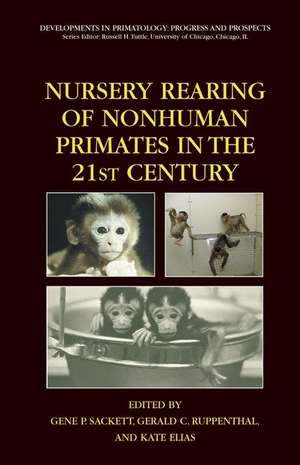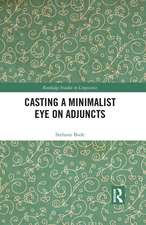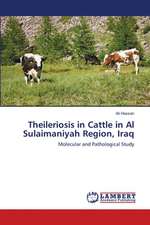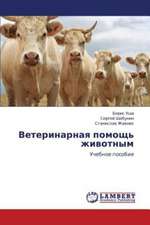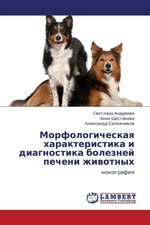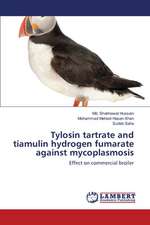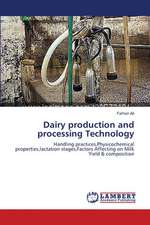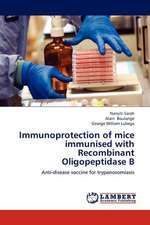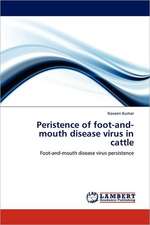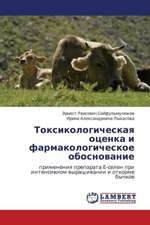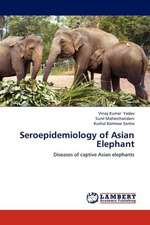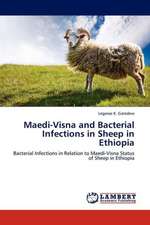Nursery Rearing of Nonhuman Primates in the 21st Century: Developments in Primatology: Progress and Prospects
Editat de Gene P. Sackett, Gerald Ruppenthal, Kate Eliasen Limba Engleză Hardback – 29 noi 2005
Examples of the changing goals of nursery rearing covered in this volume are the need for biological containment in disease research, the production of specific pathogen-free colonies by removal of neonates from the mother, the production of phenotypes for genetic and molecular biology studies, and the breeding of endangered species for conservation or research purposes.
| Toate formatele și edițiile | Preț | Express |
|---|---|---|
| Paperback (1) | 1428.54 lei 43-57 zile | |
| Springer Us – 4 dec 2014 | 1428.54 lei 43-57 zile | |
| Hardback (1) | 1433.83 lei 43-57 zile | |
| Springer Us – 29 noi 2005 | 1433.83 lei 43-57 zile |
Din seria Developments in Primatology: Progress and Prospects
- 20%
 Preț: 571.31 lei
Preț: 571.31 lei - 18%
 Preț: 1216.65 lei
Preț: 1216.65 lei - 19%
 Preț: 578.66 lei
Preț: 578.66 lei - 18%
 Preț: 956.69 lei
Preț: 956.69 lei - 18%
 Preț: 948.92 lei
Preț: 948.92 lei - 18%
 Preț: 948.92 lei
Preț: 948.92 lei - 18%
 Preț: 945.79 lei
Preț: 945.79 lei - 18%
 Preț: 962.66 lei
Preț: 962.66 lei - 18%
 Preț: 1664.43 lei
Preț: 1664.43 lei - 18%
 Preț: 1224.54 lei
Preț: 1224.54 lei - 24%
 Preț: 826.25 lei
Preț: 826.25 lei - 24%
 Preț: 802.74 lei
Preț: 802.74 lei - 18%
 Preț: 1562.94 lei
Preț: 1562.94 lei - 18%
 Preț: 950.21 lei
Preț: 950.21 lei - 18%
 Preț: 943.73 lei
Preț: 943.73 lei - 18%
 Preț: 1549.67 lei
Preț: 1549.67 lei - 18%
 Preț: 1248.20 lei
Preț: 1248.20 lei - 18%
 Preț: 941.38 lei
Preț: 941.38 lei - 24%
 Preț: 800.85 lei
Preț: 800.85 lei - 18%
 Preț: 953.35 lei
Preț: 953.35 lei - 18%
 Preț: 1827.48 lei
Preț: 1827.48 lei - 18%
 Preț: 1209.52 lei
Preț: 1209.52 lei - 18%
 Preț: 957.62 lei
Preț: 957.62 lei - 18%
 Preț: 1231.47 lei
Preț: 1231.47 lei - 18%
 Preț: 1225.48 lei
Preț: 1225.48 lei - 18%
 Preț: 1231.16 lei
Preț: 1231.16 lei - 18%
 Preț: 1226.90 lei
Preț: 1226.90 lei - 18%
 Preț: 955.25 lei
Preț: 955.25 lei - 18%
 Preț: 956.03 lei
Preț: 956.03 lei - 18%
 Preț: 1218.53 lei
Preț: 1218.53 lei - 18%
 Preț: 950.52 lei
Preț: 950.52 lei -
 Preț: 416.82 lei
Preț: 416.82 lei - 18%
 Preț: 1554.89 lei
Preț: 1554.89 lei
Preț: 1433.83 lei
Preț vechi: 1509.29 lei
-5% Nou
Puncte Express: 2151
Preț estimativ în valută:
274.36€ • 287.22$ • 227.02£
274.36€ • 287.22$ • 227.02£
Carte tipărită la comandă
Livrare economică 07-21 aprilie
Preluare comenzi: 021 569.72.76
Specificații
ISBN-13: 9780387256320
ISBN-10: 0387256326
Pagini: 602
Ilustrații: XXXII, 602 p.
Dimensiuni: 155 x 235 x 34 mm
Greutate: 1.02 kg
Ediția:2006
Editura: Springer Us
Colecția Springer
Seria Developments in Primatology: Progress and Prospects
Locul publicării:New York, NY, United States
ISBN-10: 0387256326
Pagini: 602
Ilustrații: XXXII, 602 p.
Dimensiuni: 155 x 235 x 34 mm
Greutate: 1.02 kg
Ediția:2006
Editura: Springer Us
Colecția Springer
Seria Developments in Primatology: Progress and Prospects
Locul publicării:New York, NY, United States
Public țintă
ResearchCuprins
to Section 1: The History of Nursery Rearing and a Glimpse into the Future.- The Effects of Rearing Experiences: The Early Years.- The Changing Role of Hand Rearing in Zoo-Based Primate Breeding Programs.- Animal Welfare Regulations and Nursery Rearing.- Data Management for the Nonhuman Primate Nursery.- Very Early Rearing Experience: Rationale and Methodologies for Studying Prenatal Development in Nonhuman Primates.- to Section 2: Methods and Outcomes for Infrequently Hand-Reared Species.- The Effect of Hand Rearing on the Sexual and Maternal Competence of Three Species of Lemurs, Varecia variegata, Varecia rubra, and Eulemur macaco.- Nursery-Reared Prosimian Primates.- Hand Rearing of Infant Common Marmosets (Callithrix jacchus).- to Section 3: Methods and Outcomes for Frequently Hand-Reared Species.- Immunological Consequences of Nursery Rearing.- Special Challenges of Rearing Infant Macaques Infected with Lentivirus (SIV, HIV, SHIV).- Nursery Rearing and Biobehavioral Organization.- Neurobehavioral Assessment of Nonhuman Primate Neonates.- Is It Nutrients or Nurturing? Comparison of the Growth and Development of Mother-Reared and Laboratory-Reared Macaque Infants (Macaca nemestrina).- Baboon Nursery Rearing Practices and Comparisons between Nursery-Reared and Mother-Reared Individuals.- Early Rearing Conditions and Captive Chimpanzee Behavior: Some Surprising Findings.- Effects of Early Rearing History on Growth and Behavioral Development in Captive Chimpanzees (Pan troglodytes).- to Section 4: Nursery Care Methodology and Testing Techniques for the Future.- Squirrel Monkeys as an Example of Primate Nursery Medicine.- Nursery Care of At-Risk Nonhuman Primates.- A Quick and Effective Method for Establishing Self-Feeding in Stump-Tailed Macaques (Macaca arctoides).- Saliva as a Medium for Assessing Cortisol and Other Compounds in Nonhuman Primates: Collection, Assay, and Examples.- The SPIT Method for Simultaneous and Unobtrusive Collection of Salivary Cortisol from Individually Housed Infant Monkeys.- Actimetry Measurement of Behavioral Regulation and Sleep Cycles in Infant Rhesus Macaques (Macaca mulatta).- Noninvasive Neuroimaging Techniques for the Study of Primate Brain Development.- Tethering with Maternal and Fetal Catheterization as a Model for Studying Pre- to Postnatal Continuities.- to Section 5: Hematology and Serum Chemistry Values.- Hematology and Serum Chemistry in Young Captive Chimpanzees (Pan troglodytes).- Hematology and Serum Chemistry Reference Values for Rhesus Macaque (Macaca mulatta) Infants.- Hematology and Serum Chemistry Reference Values for Pigtailed Macaque (Macaca nemestrina) Infants.- Hematology and Serum Chemistry Reference Values for Mother-Reared Squirrel Monkey (Saimiri boliviensis boliviensis) Infants.
Recenzii
From the reviews:
"This book provides both basic and applied information pertaining to the consequences and interventions used in nursery rearing. … This volume is very comprehensive and provides an excellent resource for scientists interested in the effect of early differential rearing on behavioral and physiological development. … In summary, this book is well organized, well written, and informative. It is an excellent contribution to the practical and research findings on primate infant development." (William D. Hopkins, Quarterly Review of Biology, Vol. 82, June, 2007)
"This book provides both basic and applied information pertaining to the consequences and interventions used in nursery rearing. … This volume is very comprehensive and provides an excellent resource for scientists interested in the effect of early differential rearing on behavioral and physiological development. … In summary, this book is well organized, well written, and informative. It is an excellent contribution to the practical and research findings on primate infant development." (William D. Hopkins, Quarterly Review of Biology, Vol. 82, June, 2007)
Caracteristici
The authors include some of today’s most renowned primatologists, psychologists and immunologists Includes historical overview of nursery rearing practices Covers breeding of endangered species for conservation and research Reviews and analyzes current findings, opinions, and future recommendations Includes supplementary material: sn.pub/extras
